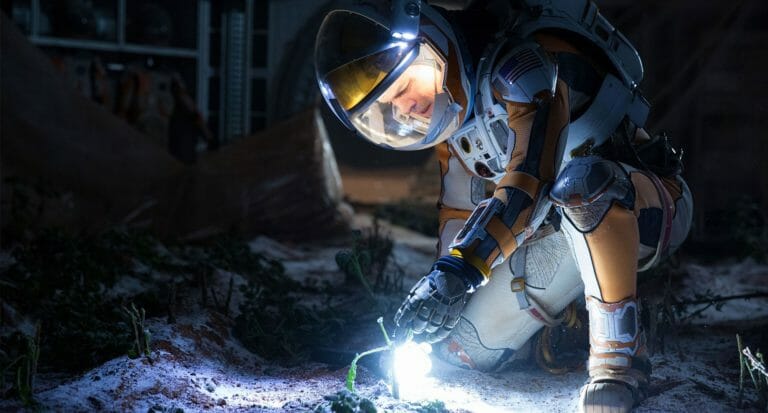Sign up for the
TSL Newsletter
and get $50 off Final Draft 12
By Christopher Ortiz · October 4, 2015

The last couple of winters treated audiences to multiple grand scale Sci-Fi films that made the most of Hollywood’s fondness for fat budgets and CGI. Gravity paved the way, blending 3D technology and visual effects with Alfonso Cuaron’s gripping long takes. Interstellar delivered an intelligently written, highly ambitious and emotional space epic achieved through practical effects and IMAX cameras. 2015 brings us The Martian — this year’s must-see Sci-fi spectacle. Engrossing and consistently funny, The Martian is the best Sci-fi film since Ex-Machina and will likely solidify its place in film history as a jargon-filled science fiction epic that’s also highly-accessible to audiences of all ages.
The film begins with Mark Watney (Matt Damon) digging into Martian soil moments before a devastating sandstorm disrupts his mission. Forced to make a perilous trek towards their vessel, Mark is hit with debris and blown far beyond his crew’s reach. With time running out and Watney presumed dead by the crew – including Michael Pena, Kate Mara, and Jessica Chastain – the team leaves the Red Planet behind, along with their fallen comrade. NASA’s director (Jeff Daniels) makes a tragic public statement and the world collectively mounrs the astronaut’s death. Fortunately, thanks to Watney’s peak physical condition and NASA designed suit (not to mention a whole lot of luck), the astronaut manages to scrape by. Alone and injured, he quickly jumps into survival mode, eventually managing to send a message back home. Once NASA discovers the truth, the gripping, painstaking journey to bring him home commences.
Like Watney, the film quickly gets into gear once he’s alone. The pace is consistently-speedy and the tone is lighter than many of Ridley Scott’s past science fiction films. Despite the daunting circumstances (which Watner explores in-depth through his various logs), he delivers lots of self-deprecating humor and remains optimistic even in the face of his isolation. A botanist by trade, Watney’s a very intelligent and creative astronaut; the film focuses in large part on the many practical things he does to survive, such as using his own waste to fertilize crops. The constant scientific jargon lends an aura of authenticity that somehow never becomes too confusing for a wider audience to grasp. The film’s speedy pacing might send some of the finer details flying over heads, but the general direction of the plot remains clear throughout.
Like Gravity and Interstellar, The Martian, directed by Ridley Scott and penned by Cabin in the Woods director Drew Goddard, tells a story of survival packaged as an adventure film. Ironically, all three films share a thematic fascination with the concept of love. Gravity concerned itself with the relationship between self-love and self-worth and the will to survive. Interstellar explored love – paternal, platonic, even romantic – and its motivating force towards humanity’s survivalist goals. The Martian completes this informal “love” trilogy by exploring the ways in which humanity comes together during moments of crisis. Less ambitious than Interstellar but smarter than Gravity, Ridley Scott’s latest is perhaps the most enjoyable film out of the three thanks to consistent humor, confident direction and many delightful performances.
Drew Goddard’s script deftly balances scientific exposition, humor, plot twists, moments of self-reflection. It’s a vast ensemble film about one man’s isolation, and yet somehow everything hums. As the entire world gathers in city squares and on Internet webpages awaiting NASA’s final rescue attempt, one can’t help but feel an incredible sense of presence. It’s a reminder that despite differences in race, religion, and political agendas, these pioneers represent humanity as a whole. They risk their lives in their efforts to push past known boundaries – the least the rest of us can do is bring them back in one piece.
Admittedly, some might lament the film’s unwillingness to push further into political or existential territory. There’s a scene near the third act in which Watney declares that “Everywhere I go, I’m the first”. As far as philosophical musings are concerned, that’s about the extent of it. The film is set over 500 days of survival, and Watney’s routine soon becomes unbearable; his food supply becomes ever more strictly rationed and his muscle mass depletes. There’s certainly something philosophical within this story, but it remains under the surface. There’s no existential brooding here – like Watney, the film uses upbeat optimism as a coping mechanism for a relatively grim situation. With the way things come together, audiences will hopefully leave the theater feeling similarly optimistic over the notion of continued space exploration.